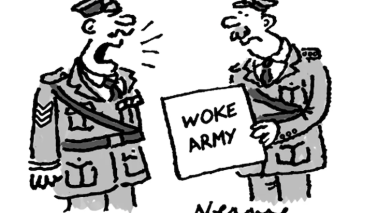Edwardian Park Lane was lined with grand houses. The occupants, conspicuous consumers and domestic servants, acted out layers of deception. Gamblers ruined Victorian fortunes. Gaiety and social graces masked the insecurities of the new rich and their struggles for acceptance in London. Upstairs, married women, harnessed by corsets and discretion, embodied compliant game. Downstairs, actually in attics, rehearsals for the 1960s were in unbroken swing. Outside, Londoners endured soot and fog.
This setting for Frances Osborne’s debut novel comes closer to John Galsworthy’s Forsyte Saga than the Marxist doctrine of social values found in Robert Tressell’s The Ragged-trousered Philanthropists. Osborne takes a cue from Galsworthy whose judgments on the humbug and insularity of the Edwardian upper middle classes, as well as support for women’s rights, sometimes pass unnoticed.
She bases the novel on the family of her great-great-grandmother. The Brasseys, 19th-century builders, generated a fortune from scratch by constructing railways on five continents. Later they sowed wealth into country estates, including one near Chipping Norton. Where else? And, of course, they owned a Park Lane property.
The author’s chief protagonists are two outsiders, Grace and Bea, young women drawn from opposite ends of the Park Lane staircase. Grace, a maid from Carlisle, by surrendering ambition for deception, ceases to be the mistress of her own destiny. Yet,with her brother, she shapes the lives of others.
Bea, a daughter of the house, is torn between conformity and emancipation. Suffocated by lame-brains — Woosters without Jeeveses — and an American mother whose virtue is easier than her temperament, Bea joins the suffragettes, so named as an insult by the Daily Mail. Her fellow militants are butch to a person. Emmeline Pankhurst’s tweedy female bodyguards even trained in the arts of jujitsu.
Bea soon puts to the test Eleanor Roosevelt’s claim that ‘a woman is like a tea bag: you cannot tell how strong she is until you put her in hot water’. Water comes no hotter than when Bea volunteers as a getaway driver for a suffragettes’ bombing raid on the Home Secretary’s house and, later, during the Great War as an ambulance driver in the Hades of northern France. Female emancipation was secured in 1918, not by window-smashing and railing-chaining radicalism, but by the examples of women in arms factories and field hospitals, and by ambulance drivers like Bea.
Park Lane is defter than a comedy of manners. It is another obituary for an Edwardian age of free will, when more outsiders than ever skirmished for acceptance and social change. Osborne echoes the refrains of Henry James and Edith Wharton, creating an air of geniality, even gentle comedy, to conceal intrigue and darkness.
But why read Osborne when Ford Maddox Ford’s Parade’s End remains in print? His was an incomparable novel of Edwardian edginess. Perhaps because Osborne empathises so well with singular women, outsiders. She is true to their fears and motivations, portraying them with honesty and conceding follies and foibles — above all with Bea, with whom she has most affinity. This is unsurprising. Osborne’s previous books of non-fiction spotlighted independent women who preferred to be first-rate versions of themselves rather than second-rate versions of somebody else, to borrow from Judy Garland.
Madox Ford, also a leading critic, claimed to scan page 99 of review copies to reach instant conclusions. Ignore his counsel. That is not the sharpest page in this book. But Park Lane brims with passages where Osborne’s emotional rapport with outsiders and pace of narrative reward the reader and uphold the bounty of her prowess.





Comments